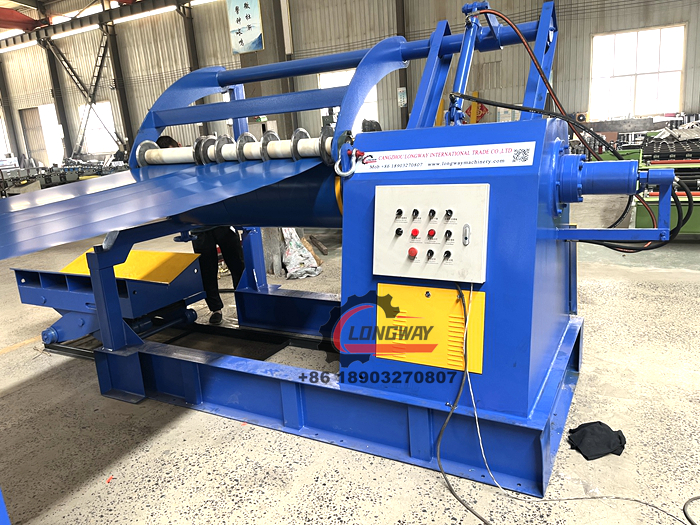roll forming aluminum factory
The Evolution and Importance of Roll Forming in Aluminum Manufacturing
In the modern era of manufacturing, the demand for lightweight, durable, and versatile materials has significantly risen. Among these materials, aluminum stands out due to its remarkable properties, including corrosion resistance, high strength-to-weight ratio, and excellent workability. One of the prevailing techniques used in shaping aluminum into required profiles is roll forming. This article delves into the intricacies of roll forming aluminum and the importance of aluminum factories in this innovative manufacturing process.
Understanding Roll Forming
Roll forming is a continuous bending process in which long strips of sheet metal are fed through a series of rollers. Each roller progressively shapes the material into a desired cross-sectional profile. This technique is particularly suitable for producing parts like structural sections, tracks, and frames, which are essential in various industries, including automotive, aerospace, construction, and furniture manufacturing.
The roll forming process begins with a flat piece of aluminum, which is fed into a roll forming machine. This machine consists of multiple sets of rollers, each designed to gradually bend and shape the material. Unlike other metal forming processes, roll forming allows for high-volume production with minimal waste. Since the process is continuous, it is highly efficient, making it ideal for manufacturers looking to produce large quantities of parts.
Benefits of Roll Forming Aluminum
1. Cost-Effective Production One of the primary advantages of roll forming aluminum is its cost-effectiveness. The process minimizes waste and requires less energy compared to other metal shaping methods. This ensures that manufacturers can produce high-quality components at lower costs.
2. Consistency and Precision The roll forming process allows for exceptional repeatability and precision. Once the initial setup is complete, the same profile can be produced consistently, ensuring that parts meet stringent specifications.
3. Versatility in Design Roll forming enables the production of complex shapes that are often difficult to achieve through other methods. Manufacturers can create tailored designs for specific applications, ranging from simple angles to intricate sections with multiple bends.
4. Enhanced Strength Aluminum parts produced through roll forming can exhibit enhanced strength due to the work-hardening effect that occurs during the process. This makes roll-formed aluminum not only lighter but also stronger, which is a crucial consideration in industries where weight reduction is vital.
roll forming aluminum factory

5. Surface Finishing Options Roll formed aluminum can be easily anodized, painted, or coated, providing manufacturers with various options for surface treatment. This is essential for applications requiring enhanced appearance or corrosion resistance.
The Role of Aluminum Factories in Roll Forming
Aluminum factories play a vital role in the roll forming process. These facilities are equipped with advanced machinery and technologies that enable precise shaping and finishing of aluminum products. A modern aluminum factory focuses on several key areas
1. Sourcing Quality Raw Materials High-quality aluminum alloys are essential for successful roll forming. Factories work closely with suppliers to ensure that they receive the best materials, which directly impacts the performance of the final products.
2. Advanced Machinery Modern roll forming machines are engineered for efficiency and precision. Factories invest in state-of-the-art technology to streamline production processes, reduce lead times, and improve product quality.
3. Skilled Workforce A knowledgeable and skilled workforce is crucial for operating complex machinery and maintaining quality standards. Factories often provide training programs to ensure employees are proficient in both the technical and safety aspects of roll forming.
4. Quality Control Rigorous quality control processes are implemented throughout the manufacturing cycle. From raw material inspection to final product testing, manufacturers ensure that each component meets industry standards and customer requirements.
5. Customization Capabilities Many aluminum factories offer customization services, allowing clients to specify exact dimensions, profiles, and finishes. This flexibility enhances customer satisfaction and strengthens business relationships.
Conclusion
As industries continue to seek lightweight and durable materials, the role of roll forming aluminum is becoming increasingly significant. Aluminum factories equipped with advanced technologies and skilled workers are at the forefront of this evolution. By leveraging the benefits of roll forming, these manufacturers are not only meeting the growing demands of various sectors but also contributing to sustainable practices through efficient production methods. As we look to the future, the importance of roll forming aluminum in manufacturing is sure to grow, paving the way for innovative applications and designs.
-
Roof Panel Machines: Buying Guide, Types, and PricingNewsJul.04, 2025
-
Purlin Machines: Types, Features, and Pricing GuideNewsJul.04, 2025
-
Metal Embossing Machines: Types, Applications, and Buying GuideNewsJul.04, 2025
-
Gutter Machines: Features, Types, and Cost BreakdownNewsJul.04, 2025
-
Cut to Length Line: Overview, Equipment, and Buying GuideNewsJul.04, 2025
-
Auto Stacker: Features, Applications, and Cost BreakdownNewsJul.04, 2025
-
Top Drywall Profile Machine Models for SaleNewsJun.05, 2025








